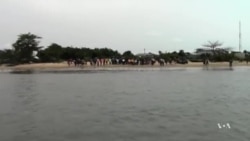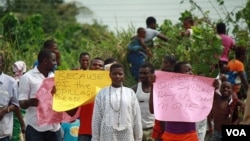YOUBEBE, NIGERIA —
Local leaders in the Niger Delta want to unite competing communities to pressure Shell Petroleum to pay billions of dollars in reparations and clean up of fishing areas they say were wasted in a 2011 oil spill. Shell disputes the claim, maintaining the spill never hit Nigerian shores or damaged the fishing industry.
On the beach of Youbebe, a fishing community in the Niger Delta, protesters demand journalists get off the boat to hear what they have to say.
About two million lives were devastated by the Bonga oil spill, they say, holding up water that appears to be polluted with oil. They say their children are always hungry because there are no fish to eat or sell.
“They destroyed the river so we do not get fish again," said Sia. "The river is polluted. There is no fish.”
But Shell says the spill from its Bonga oil field was cleaned up swiftly after the leak and it never harmed the communities.
The company says there was another spill from an unknown vessel shortly after the Bonga spill and Shell spent several million dollars cleaning up both spills, even though the second was not its fault.
But as the protesters shake branches as a symbol of anger, they demand humanitarian aid, payment for lost incomes, and that Shell clean up the oil, saying oil companies have been taking advantage of delta residents for decades.
On the other side of the beach, Sia shows us an oil pipeline that runs from a nearby processing plant, through the village and into the water.
“This is where the pipe passes.," said Sia "High pressure pipeline. As you can see the pipes are corroded. If this pipe gets split now there will be oil spillage all over. There is crude passing this place.”
Other protesters lead us into their village.
There is no electricity or hospital, and young men pull more dirty water out of what looks like a spring. They drink it while photographers take pictures. The men want people to see that they are drinking water polluted with oil.
About an hour away by speedboat, in the nearest city Warri, traditional rulers say they want to negotiate with the oil company, known locally as SPDC, for the sum of $5.6 billion to compensate and clean up fishing communities.
His Royal Highness Ibamugha Ojukosin. says, “We are here as a people collectively with one voice. Let our cry be heard. Let [victims of] Bonga spill of SPDC in 20 December 2011 be adequately compensated, the communities cleaned. And let us be paid. I would want to rest my case.”
Other leaders say Niger Delta communities have in the past failed to extract compensation from oil companies because the communities are hopelessly divided on the issue of who is and who is not owed.
At this conference in Warri, leaders and lawyers work to unite communities but some attendees say they believe that if Shell does pay, the only real beneficiaries will be the leaders.
Early this year, government agencies demanded Shell pay an $11.5 billion fine for the Bonga spill. Shell says these fines were never levied and the company has not paid any fines associated with the Bonga spill because it is not liable "legally or otherwise."
Protesters on the beach say the issue is simpler than that. They want the company to pay up or get out.
A resident says, “The next step we take if the protest do not succeed, SPDC will leave our lands. That’s what we’ll do. And no army man can stop us.”
In the past, delta residents have rebelled against oil companies and the government. Traditional leaders say they fear more unrest in the Niger Delta if the people's concerns are not addressed.
On the beach of Youbebe, a fishing community in the Niger Delta, protesters demand journalists get off the boat to hear what they have to say.
About two million lives were devastated by the Bonga oil spill, they say, holding up water that appears to be polluted with oil. They say their children are always hungry because there are no fish to eat or sell.
“They destroyed the river so we do not get fish again," said Sia. "The river is polluted. There is no fish.”
But Shell says the spill from its Bonga oil field was cleaned up swiftly after the leak and it never harmed the communities.
The company says there was another spill from an unknown vessel shortly after the Bonga spill and Shell spent several million dollars cleaning up both spills, even though the second was not its fault.
But as the protesters shake branches as a symbol of anger, they demand humanitarian aid, payment for lost incomes, and that Shell clean up the oil, saying oil companies have been taking advantage of delta residents for decades.
On the other side of the beach, Sia shows us an oil pipeline that runs from a nearby processing plant, through the village and into the water.
“This is where the pipe passes.," said Sia "High pressure pipeline. As you can see the pipes are corroded. If this pipe gets split now there will be oil spillage all over. There is crude passing this place.”
Other protesters lead us into their village.
There is no electricity or hospital, and young men pull more dirty water out of what looks like a spring. They drink it while photographers take pictures. The men want people to see that they are drinking water polluted with oil.
About an hour away by speedboat, in the nearest city Warri, traditional rulers say they want to negotiate with the oil company, known locally as SPDC, for the sum of $5.6 billion to compensate and clean up fishing communities.
His Royal Highness Ibamugha Ojukosin. says, “We are here as a people collectively with one voice. Let our cry be heard. Let [victims of] Bonga spill of SPDC in 20 December 2011 be adequately compensated, the communities cleaned. And let us be paid. I would want to rest my case.”
Other leaders say Niger Delta communities have in the past failed to extract compensation from oil companies because the communities are hopelessly divided on the issue of who is and who is not owed.
At this conference in Warri, leaders and lawyers work to unite communities but some attendees say they believe that if Shell does pay, the only real beneficiaries will be the leaders.
Early this year, government agencies demanded Shell pay an $11.5 billion fine for the Bonga spill. Shell says these fines were never levied and the company has not paid any fines associated with the Bonga spill because it is not liable "legally or otherwise."
Protesters on the beach say the issue is simpler than that. They want the company to pay up or get out.
A resident says, “The next step we take if the protest do not succeed, SPDC will leave our lands. That’s what we’ll do. And no army man can stop us.”
In the past, delta residents have rebelled against oil companies and the government. Traditional leaders say they fear more unrest in the Niger Delta if the people's concerns are not addressed.







